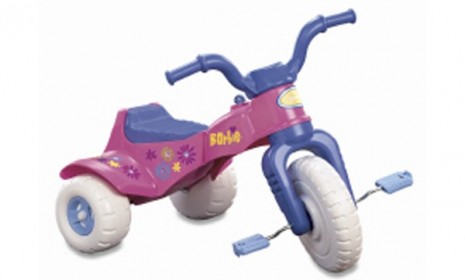The Fisher-Price recall: Should parents worry?
The toy company is recalling more than 11 million tricycles, toys, and high chairs over safety concerns

A free daily email with the biggest news stories of the day – and the best features from TheWeek.com
You are now subscribed
Your newsletter sign-up was successful
Fisher-Price has announced a wide-reaching recall of more than 11 million toys and kids' products. In a statement issued last week, the company's general manager, Kevin Curran, assured parents that Fisher-Price toys are "overwhelmingly safe," although problems have been reported with the items included in the recall. What do parents need to know about the massive recall? (Watch an AP report about the recall)
What has been recalled?
More than 7 million tricycles, 1 million high chairs, 2.9 million infant toys, and 120,000 toy cars and ramps. Nearly 50 products are included in the recall. The website of Fisher-Price's parent company, Mattel, has a detailed list.
The Week
Escape your echo chamber. Get the facts behind the news, plus analysis from multiple perspectives.

Sign up for The Week's Free Newsletters
From our morning news briefing to a weekly Good News Newsletter, get the best of The Week delivered directly to your inbox.
From our morning news briefing to a weekly Good News Newsletter, get the best of The Week delivered directly to your inbox.
Why have these items been recalled?
There have been ten reports of injuries, including genital bleeding, on the tricycles. A protruding part near the bike's seat, which children can fall or accidentally sit on, is the alleged culprit. There have been 14 reported problems with the high chairs, which have pegs sticking out the back that children can fall onto. Fifty people have reported valves coming out of inflatable toy balls, creating a choking risk. And wheels have come off some toy cars, also posing a choking hazard.
Have any children been badly hurt?
No deaths have been reported, but some children required medical attention, including stitches.
A free daily email with the biggest news stories of the day – and the best features from TheWeek.com
Was the recall voluntary?
Yes. Inez Tenenbaum, who chairs the U.S. Consumer Product Safety Commission, applauded Fisher-Price for "taking the right steps by agreeing to these recalls and offering consumers free repairs or replacement." But she also said manufacturers need to do more to ensure the safety of products before they hit store shelves.
What should parents do if their children's toys have been recalled?
First and foremost, the company says, parents should make sure their children don't use any toys or items they suspect have been recalled. To check, parents can visit the Mattel website or call 1-800-432-5437. At this point, Fisher-Price is offering replacements and repair kits, not refunds.
How common are toy recalls?
Pretty common. So far this year, there have been 27 recalls. But that is not necessarily a bad thing, says Dr. Ben Pollara, emeritus professor of pediatrics at the University of South Florida. Recalls show the system is working, and saving lives, he says. "When you think about the number of toys that are sold — I mean billions of them — the number of injuries that are serious is very small."
How can parents tell if a toy poses a choking risk?
"The best way to test the choking hazard of any toy, or any product you have in your home, is to use a tube of toilet paper," says Don Mays, director of product safety for Consumer's Union. "If the product actually falls through that tube, it has the potential of choking a child ages 3 or less."
What else can parents do?
Pollara says parents should regularly examine their children's toys, recall or no recall. Keep an eye out for loose parts and small pieces that could pose a choking hazard. Broken toys should be tossed out.
Sources: The Sacramento Bee, The Washington Post, Tampa Bay Online, CNN Money
-
 Film reviews: ‘Send Help’ and ‘Private Life’
Film reviews: ‘Send Help’ and ‘Private Life’Feature An office doormat is stranded alone with her awful boss and a frazzled therapist turns amateur murder investigator
-
 Movies to watch in February
Movies to watch in Februarythe week recommends Time travelers, multiverse hoppers and an Iraqi parable highlight this month’s offerings during the depths of winter
-
 ICE’s facial scanning is the tip of the surveillance iceberg
ICE’s facial scanning is the tip of the surveillance icebergIN THE SPOTLIGHT Federal troops are increasingly turning to high-tech tracking tools that push the boundaries of personal privacy